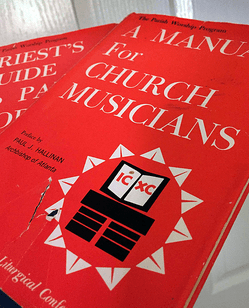
 OT LONG AGO, I wrote about an article by Susan Benofy. I mentioned that Susan’s articles are usually excellent, but poorly formatted. The type is small, the margins wide, pictures & headers are lacking, and so forth.
OT LONG AGO, I wrote about an article by Susan Benofy. I mentioned that Susan’s articles are usually excellent, but poorly formatted. The type is small, the margins wide, pictures & headers are lacking, and so forth.
Susan was critical of several books published in the 1960s. I said in my article that it would be interesting to find those books. A generous reader sent me copies of several, and I scanned & uploaded this one:
* * PDF • MANUAL FOR CHURCH MUSICIANS (1964)
On the whole, the books were not as goofy as I feared they might be. However, they contain tons of bland, unnecessary, and unhelpful information. They tell the readers stuff like, “Don’t do bad music at Church. Bad music is bad. Do good music. Good music is good. Flat singing may be due to poor ventilation. Don’t sing hymns too fast. Don’t sing hymns too slowly, either.”
Here’s an example that bothered Susan Benofy…and for good reason:
Although the plain chant is one of the priceless treasures, it is primarily the domain of the monastery; it has never been the actual treasure of the American parish. Our priests were “exposed” to it during the formative years of the seminary training, and occasionally a hard-working choirmaster has introduced it, but not without hard effort and even some opposition. There is no need to fear that the chant will be lost, for the monastery will preserve it, whereas the parish never really possessed it. For the monk, Latin will not prove a barrier to his understanding of the Church’s ceremonial; for the average parishioner, English will prove an invitation to an understanding of the worship of the Whole Christ that Latin could never give.
In another book from 1964, we find this rather bizarre chart:
* * PDF Download • Low Mass Chart (1964)
Can you imagine the “Commentator” up there explaining the Post-Communion? I doubt this happened in any parish:

